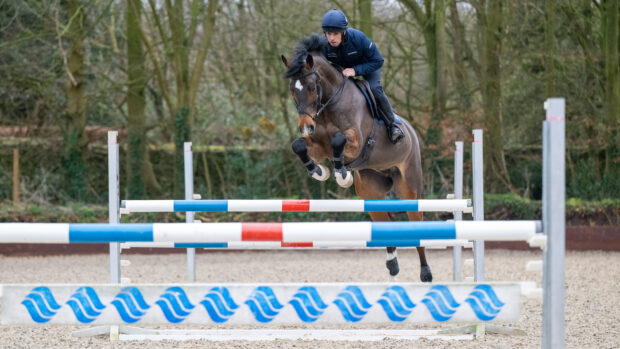A showjumper whose positive dope test was caused by a contaminated weight loss supplement has been given a 12-month ban.
Czech rider Emma Augier De Moussac tested positive for hydrochlorothiazide, a diuretic, in a urine sample taken at the CSI3* Olympic qualifier for group C in Budapest on 28 June 2019.
At the time of the sample, the rider noted on the disclosed doping control form that she was on a treatment for her skin, as well a weight loss product, the last dose of which she had taken that morning.
Ms Augier De Moussac was notified of the positive sample in September 2019 and she told the FEI the prohibited substance had entered her system via the weight loss supplement. She accepted a voluntary provisional suspension on 23 December.
On 4 February the rider and her legal counsel met the FEI to discuss her case. She explained she had been trying to lose weight for some time and was looking for a weight loss product for “beauty-oriented objectives” only. The FEI heard she had talked about the issue with her family and had even considered surgery.
Ms Augier De Moussac told the FEI her brother-in-law had recommended a weight loss product to her that gave good results without side effects, and was sold over the counter in Brazil. In an affidavit from her brother-in-law, he explained he had learned about the product on Instagram and contacted the seller, who guaranteed it contained 100% natural ingredients. The product’s package leaflet did not include hydrochlorothiazide, or any other prohibited substance, and also claimed it was produced in accordance with Brazilian law, which the rider said gave a false impression it was approved by the authorities.
She told the FEI she does not take any medications or supplements, except for sometimes aspirin and vitamin C. She explained she is very careful when it comes to the use of drugs as she had a close family member who had drug problems.
After Ms Augier De Moussac was notified of the positive sample, she contacted the seller of the product to ask if it contained the banned substance and was informed it could contain traces, but this was not stated in the leaflet. She had the product analysed at a specialised laboratory and it was found it did include hydrochlorothiazide – as well as other substances on the prohibited list; furosemide, a drug used to reduce extra fluid in the body, and appetite suppressant sibutramine. It was also found to contain antacid ranitidine, antidepressants fluoxetine and bupropion, and muscle relaxant diazepam. Ms Augier De Moussac told the FEI she felt it was a very “unfair” situation as she had used the product in good faith, and she had no intention to cheat.
On 29 May and 10 June the FEI Tribunal was told that an agreement had been reached between the FEI and Ms Augier De Moussac, after she admitted to the presence of hydrochlorothiazide and had established how it had entered her system.
Article continued below…

Driver urinating in horsebox caused positive dope test: showjumper’s suspension lifted
The European team bronze medal-winning showjumper’s horse had tested positive for a metabolite of tramadol, at a CSI3* event in

Record FEI ban for rider of ‘nerve-blocked’ horse who suffered horrific fracture

Subscribe to Horse & Hound magazine today – and enjoy unlimited website access all year round
As she had established it was not intentional, the standard two-year ineligibility period could be reduced. It was agreed she had not borne significant fault and negligence, and she was banned for 12 months from 28 June 2019. She was also fined 2,000 Swiss francs (£1,695), and must complete an anti-doping education course in one year. Any show results obtained between 28 June and 23 December 2019 are disqualified.
A spokesman for the FEI said despite the fact the organisation considers the weight loss product to be a contaminated product as the prohibited substance was not disclosed on the label, it cannot be ignored the product is also a supplement. Athletes are responsible for what they ingest and have been warned against the possibility of supplement contamination. In the FEI’s view, the lowest range of sanctions can therefore not be applied in a case when the contaminated product is a supplement.
The FEI Tribunal accepted the agreement between the FEI and the rider.
We continue to publish Horse & Hound magazine weekly during the coronavirus pandemic, as well as keeping horseandhound.co.uk up to date with all the breaking news, features and more. Click here for info about magazine subscriptions (six issues for £6) and access to our premium H&H Plus content online.



